School Year of Core Vocabulary Words: AAC Resources for Month 11 (June) by Michaela Sullivan, Alisa Lego, & Beth Lytle
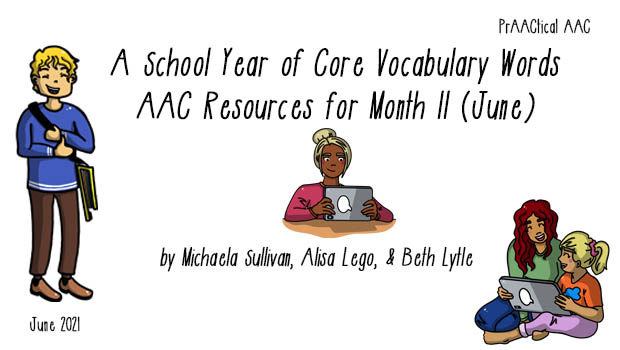
We’re jumping into June and wrapping up the School Year of Core Vocabulary Words Series by guest authors Michaela Sullivan, Alisa Lego, and Beth Lytle. This series focuses on a selected set of words to highlight for the month along with a suggested order in which to teach them. Therapists and teachers will appreciate the Activity Packets, containing suggestions for highlighting these words in a variety of activities. Their Data Collection Forms and tips on using shared reading in our AAC teaching are appropriate for AAC learners of various ages.
If you are new to this series, you may want to review the introduction that our series and check out the first 10 months of the School Year of Core Vocabulary Words using the links below.
You can find posts for previous months in the School Year of Core Vocabulary Words below.
- Introduction to the School Year of Core Vocabulary Words Series
- Month 1: August
- Month 2: September
- Month 3: October
- Month 4: November
- Month 5: December
- Month 6: January
- Month 7: February
- Month 8: March
- Month 9: April
- Month 10: May
A SCHOOL YEAR OF CORE INTRODUCTION – JUNE
To the parents, teachers, Speech-Language Pathologists, Paraprofessionals, friends, and other curious professionals or communicators – welcome back to the last monthly School Year of Core Words posting- June 2021 Edition.
June is officially here, which marks the completion of the School Year of Core. It has been a pleasure to put together these resources for you and we have loved hearing how these materials have been implemented. The past year of working on this project has forever changed the way we look at core vocabulary and the power of language in connecting with others. We hope this project will continue to impact and foster core language vocabulary growth for many years to come.
Many of the June Level 1 and Level 2 words are words that can be used to wrap up the school year. The words include favorite, proud, last, see you later, and more. This is a great time to reflect on the school year and how it has been for our students in this unprecedented time.
We are thankful for the amazing Core Contributors who have worked tirelessly to create the activity sheets and resources in the postings. We could not have completed this project without the hard work, talent, creativity, and dedication that our Core Contributors provided. We appreciate them and cannot thank them enough for everything they have done!
Our Featured Core Contributors for the Month of June include:
- Shanaz Faisal
- Sam Lin
- Abbie Duarte
- Wes Heidenreich
- Sophie Goodwin
- Liz Cambra
- Andriana Nikolau
- Jessica Oseguera
- Beth Kenney
- Diana V. Angeles
- Molly Hartzell
Enjoy Month 11 of the School Year of Core Words!
THE WORDS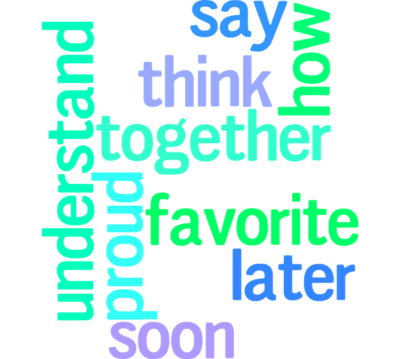
Level 1 words for June: say, think, soon, later, together, understand, proud, favorite, how
The suggested sequence for implementation is listed below:
- Week 1: say, think, soon, later
- Week 2: together, understand, proud, favorite
- Week 3: how
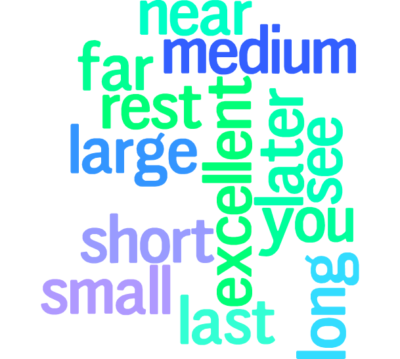 Level 2 words for June: near, far, long, short, small, medium, large, excellent, rest, last, see you later
Level 2 words for June: near, far, long, short, small, medium, large, excellent, rest, last, see you later
The suggested order for these words is listed below:
- Week 1: near, far, long, short
- Week 2: small, medium, large, excellent
- Week 3: rest, last, see you later
THE SYMBOLS
You can download grids with the symbols for this month’s words from the lists below. These handy tools can help us remember what words to focus on and be useful in our intervention and instruction.
Level 1 Words
- Avaz
- CoughDrop
- LAMP Words for Life
- Wordpower 60 Basic
- Unity 45 Sequenced
- Unity 60 Sequenced
- Unity 84 Sequenced
- Blank Grid (add your own symbols)
Level 2 Words
- Avaz
- CoughDrop
- LAMP Words for Life
- Wordpower 60 Basic
- Unity 45 Sequenced
- Unity 60 Sequenced
- Unity 84 Sequenced
- Blank Grid (add your own symbols)
THE ACTIVITIES
These sets of Activity Packets are divided into weeks and can be downloaded for easy access.
Activity Packets for Level 1 Words
Activity Packets for Level 2 Words
Strategy of the Month: PRESUMING COMPETENCE
The act and practice of Presuming Competence have been referred to as the least dangerous assumption, (Anne Donnellan, 1984) and applying this ‘mindset’ may be highly beneficial when selecting and implementing an AAC system for the individuals with whom we work. As parents, educators, therapists, and others, we all want our students to be able to say, ‘whatever they want, however they want, whenever they want,’ and once a student is exposed to and provided with a robust communication system it can provide them with opportunities to learn and use a rich core and fringe vocabulary to express themselves using a wide array of communication functions. Communication is a human right and we are in a position to open up their access to words that have power. When we Presume Competence, we believe everyone can learn.
Please find the following additional resources on Presuming Competence below. These resources may be helpful for individual learning and/or for team training.
The Importance of Presuming Competence Ms. Moore shares her ideas about presuming competence in ALL students. According to Ms. Moore, this video targets ‘one of the biggest barriers to inclusive education – mindset. This video will encourage you to reflect on your own assumptions about disability and start to take action to disrupt the ableist structures in education by taking a very important first step…. presuming competence in all students. Courtesy of Five Moore Minutes, by Shelley Moore.
Under the Table – The Importance of Presuming Competence |Courtesy of Shelley Moore | TEDxLangleyED 2016. In this engaging and enlightening TedTalk, Shelley Moore discusses inclusive education and presuming competence at large and goes in-depth about how she learned about Presuming Competence from one of her students with Complex Communication Needs. This Tedx Talk is so rich, thought-provoking and deeply moving and could be utilized for a large or small group to discuss how we have reached our students with great needs.
Shelley Moore has worked in both elementary and secondary schools supporting students with and without special needs in inclusive contexts in Alberta, New York, and British Columbia. She is currently an inclusive consultant in the Richmond School District, as well as various other districts throughout the province. She has presented conferences both nationally and internationally and is a sessional instructor at Simon Fraser University, University of British Columbia, and University Of British Columbia – Okanagan
One of Ms. Moore’s slides in the Ted Talk. (priceless)
Presuming Competence This video discusses presuming competence of people with disabilities, which competence means believing people are capable and that they do understand you even if they don’t outwardly show you that they do. Courtesy of TheCQL
- Presuming Competence in Practice by Heidi LoStracco, M.S. CCC-SLP, January 15, 2017
- Presuming competence: the only prerequisite to AAC
- Model as a MASTER PAL: Module 9 – Presume Potential
DATA COLLECTION & ACCOUNTABILITY FORMS
Taking data to measure performance and keeping track of our own modeling behavior are two things we can do to strengthen our AAC teaching. Here are some forms that you can use to support those efforts.
This posting is dedicated to all of you SLP’s, parents, educators, and therapists who are making a difference every day!
Core Contributors for School Year of Core
We’d like to recognize and thank ALL core contributors that helped make this project a reality. We wouldn’t have done it without you!
- Sam Lin
- Abbie Duarte
- Wes Heidenreich
- Sophie Goodwin
- Liz Cambra
- Andriana Nikolau
- Jessica Oseguera
- Beth Kenney
- Diana V. Angeles
- Molly Hartzell
- Nancy Robinson
- Carolann Cormier
- Jamie Deiner
- Alice Mui
- Meaghan Rose Baron
- Nicole Natale
- Edna-Jo Piccirillo
- Nico Lu
- Amy Burt
- Mary Hamilton
- Moira Ikeda
- Jordan Stuhltrager
- Kelsey Robin
- Jennifer Yoshimura
- Shanaz Faisal
- Gail Tsujimoto-Cho
- Karen Fahey
About the School Year of Core Vocabulary Series Authors
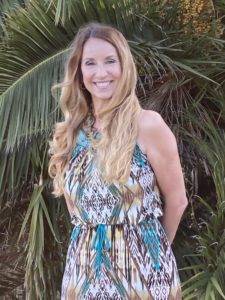 Michaela Sullivan is an SLP who specializes in the fields of AAC and AT. She currently works within the San Francisco Unified School District on the AAC Support Team working with students with Complex Communication Needs across the district and on special projects. Additionally, Ms. Sullivan provides AAC mentorship for colleagues and supervises graduate student interns. Ms. Sullivan also works in her private practice. She has been a presenter in the field of Speech-Language Pathology and AAC at state and national conventions. She serves as a board member and volunteer for The Nika Project, providing services, support, resources, training, and repurposed equipment for individuals with complex communication needs both locally and internationally.
Michaela Sullivan is an SLP who specializes in the fields of AAC and AT. She currently works within the San Francisco Unified School District on the AAC Support Team working with students with Complex Communication Needs across the district and on special projects. Additionally, Ms. Sullivan provides AAC mentorship for colleagues and supervises graduate student interns. Ms. Sullivan also works in her private practice. She has been a presenter in the field of Speech-Language Pathology and AAC at state and national conventions. She serves as a board member and volunteer for The Nika Project, providing services, support, resources, training, and repurposed equipment for individuals with complex communication needs both locally and internationally.
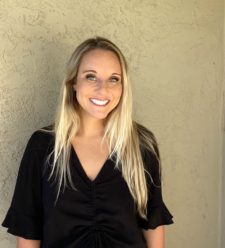 Alisa Lego is a second-year graduate student and candidate for Master of Science in Speech, Language and Hearing Sciences at San Francisco State University. Alisa is specializing in AAC through San Francisco State University’s federally funded Project Building Bridges. Alisa is also a candidate for the Autism Spectrum Graduate Certificate. Through Project Building Bridges, she has joined the Nika project and is providing resources for individuals with complex communication needs both locally and across the globe. You can follow Alisa on Instagram at @newfriendscollective.
Alisa Lego is a second-year graduate student and candidate for Master of Science in Speech, Language and Hearing Sciences at San Francisco State University. Alisa is specializing in AAC through San Francisco State University’s federally funded Project Building Bridges. Alisa is also a candidate for the Autism Spectrum Graduate Certificate. Through Project Building Bridges, she has joined the Nika project and is providing resources for individuals with complex communication needs both locally and across the globe. You can follow Alisa on Instagram at @newfriendscollective.
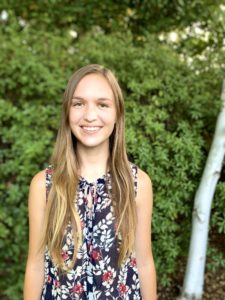 Beth Lytle is a second-year graduate student and candidate for Master of Science in Speech, Language and Hearing Sciences at San Francisco State University. Beth is specializing in AAC through San Francisco State University’s federally funded Project Building Bridges. Through Project Building Bridges, she has joined the Nika project and is providing resources for individuals with complex communication needs both locally and across the globe.
Beth Lytle is a second-year graduate student and candidate for Master of Science in Speech, Language and Hearing Sciences at San Francisco State University. Beth is specializing in AAC through San Francisco State University’s federally funded Project Building Bridges. Through Project Building Bridges, she has joined the Nika project and is providing resources for individuals with complex communication needs both locally and across the globe.
Filed under: Featured Posts, PrAACtical Thinking
This post was written by Carole Zangari
